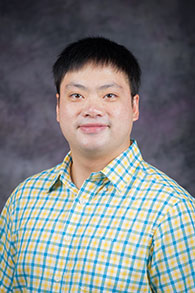K-State engineer receives collaborative NSF grant to build sustainable infrastructure for tribal communities
Wednesday, Sept. 27, 2023
MANHATTAN — A Kansas State University engineering professor is developing sustainable microgrid infrastructure to improve the reliability of power systems in Indigenous nations.
Hongyu Wu, associate professor in the Carl R. Ice College of Engineering, has received a grant of more than $1.1 million from the National Science Foundation to engineer and develop infrastructure solutions to improve the reliability and resilience of power, heating and fuel energy systems for Indigenous nations and communities and partner with them to create enhanced national and tribal energy sovereignty.
The four-year project, "Sustainable Engineering Infrastructures and Solutions for Tribal Energy Sovereignty," includes $4 million in total funding through the NSF's Established Program to Stimulate Competitive Research program, which aims to build collaboration between similar jurisdictions with complementary expertise. Wu will serve as a co-principal investigator on the project, leading K-State's portion alongside colleagues from the University of North Dakota and North Dakota State University.
Collaborators from K-State also include LaVerne Bitsie-Baldwin, director of the Carl R. Ice College of Engineering's Multicultural Engineering Program, Bo Liu, research assistant professor of electrical and computer engineering, and Yingying Wu, associate professor of fashion design in the interior design and fashion studies department. Local Indigenous partners are Haskell Indian Nations University and the Prairie Band Potawatomi Nation.
The goal of Wu's portion of the project is to engineer and develop power microgrid technologies with both on- and off-grid modes — depending on energy demands and surpluses — that emphasize sustainability, reliability and efficiency. Bitsie-Baldwin will work toward the outreach goal of facilitating research opportunities and scholarships for Indigenous students and creating an Indigenous-centered learning environment.
"Indigenous communities often encompass rural, widely dispersed populations that rely on decentralized, smaller-scale power, heating and fuel energy systems," Wu said. "Unfortunately, these systems are prone to reduced reliability and limited resilience in the face of projected shifts in weather patterns and increased climate change-related impacts. Our group is seeking to confront these pressing challenges and enhance tribal energy sovereignty."
Wu said the primary research outcome for the project is to build innovative renewable energy and microgrid technologies, including scalable photovoltaic-thermal systems, on-demand energy storage, renewable fuel production and adaptive power microgrids. The research group will also be working directly with Indigenous citizens and governments to make holistic assessments and incorporate economic, sustainability and social factors into its recommendations.
Wu holds the Lucas-Rathbone Professorship in Engineering and is a Steve Hsu keystone research scholar in the Mike Wiegers Department of Electrical and Computer Engineering.

